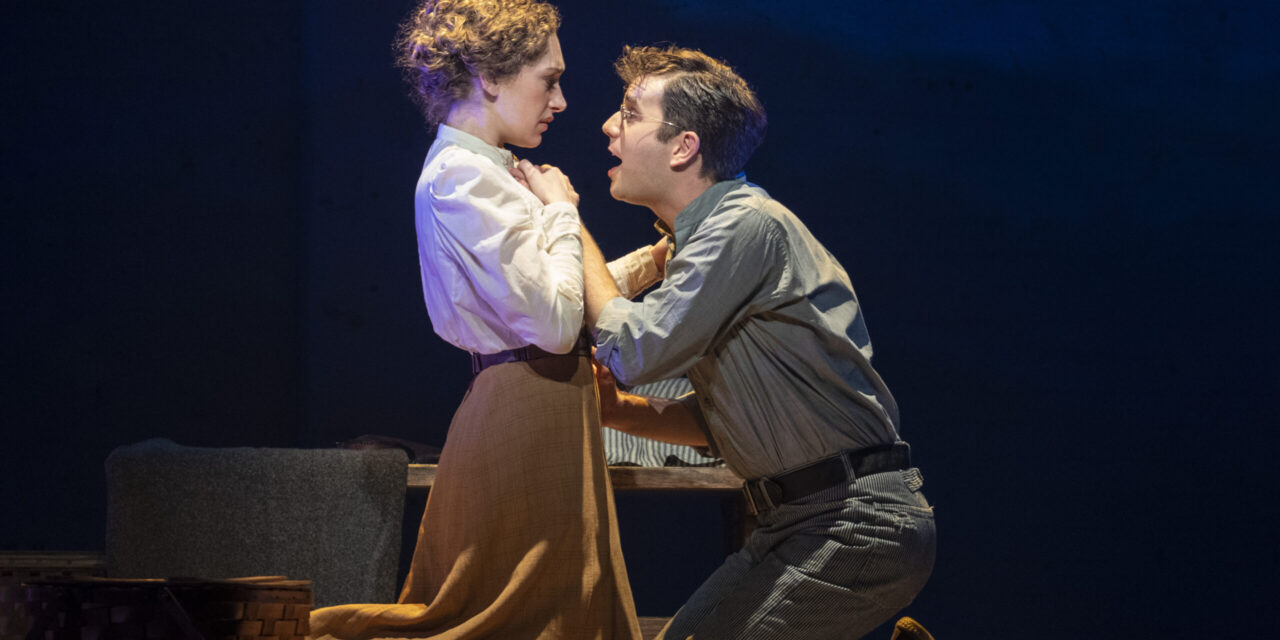By Carole Di Tosti . . .
Entrenched cultural attitudes die hard, but their remnants give rise to a future hope for re-examination and change. Such is manifest in the complex, ongoing story found in the superlative musical Parade, a memorial to Jewish-American Leo Frank and the Atlanta, Georgia tide of times between 1913-1915.
Parade’s exceptional dramatization by Alfred Uhry with music and lyrics by Jason Robert Brown concerns Leo Frank’s 1913 trial, death penalty verdict, Georgia governor’s commutation to life imprisonment, and Frank’s 1915 lynching. Astutely directed by Michael Arden with currency and moment, its superb orchestra is conducted by music director Tom Murray with orchestrations by Don Sebesky and Jason Robert Brown. With a creative team that includes Jon Weston’s sound design, Susan Hilferty’s costumes, and choreography by Lauren Yalango-Grant and Christopher Cree Grant, the revival (with one intermission) is astounding audiences at the Bernard B. Jacobs Theatre.
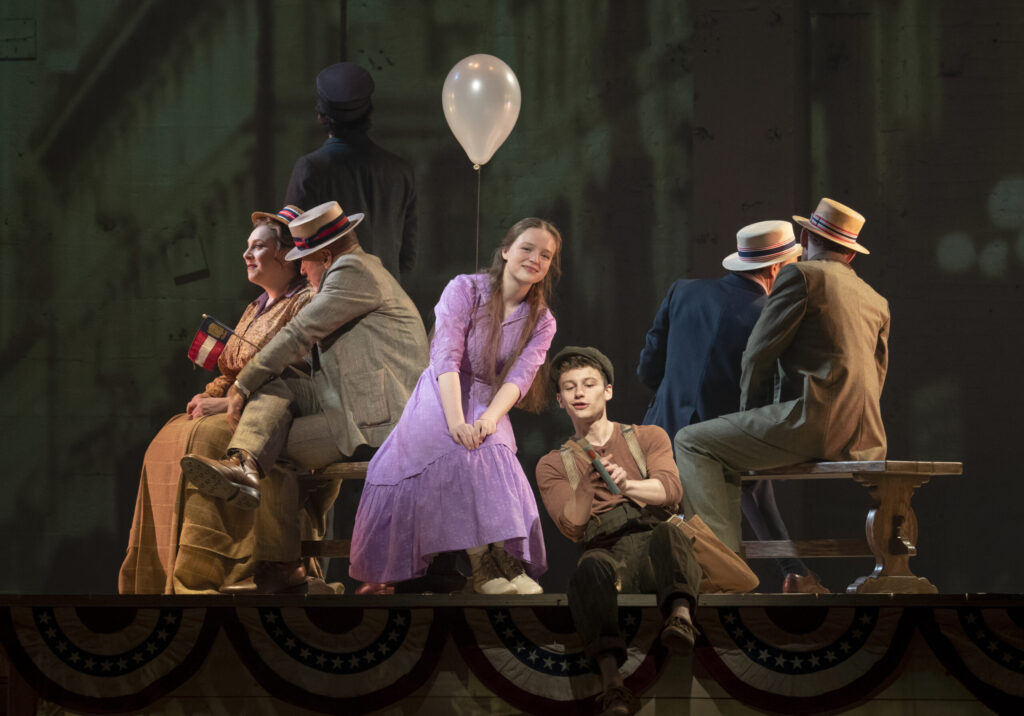
Co-conceived and directed by Hal Prince, when the production premiered in 1998, Parade won Tony Awards for Best Book and Best Original Score. As a part of City Center’s 2022-2023 season, Parade, which ran November 1-6, received praise for its director, creative team and golden-voiced stars Ben Platt and Micaela Diamond.
In its transfer to Broadway, on its first day of previews Parade sparked controversy and protests. However, Parade’s immutable themes—spiritual triumph over loss, inexorable truth shining through history, and life lived with honor and love, despite treachery—will always resonate with audiences. A quintessentially American musical, Parade’s story and themes are transcendent. The current production is a must-see for its pageantry, vibrance, humanity and power, as conveyed by the gobsmacking performances of Ben Platt and Micaela Diamond and a terrific cast.
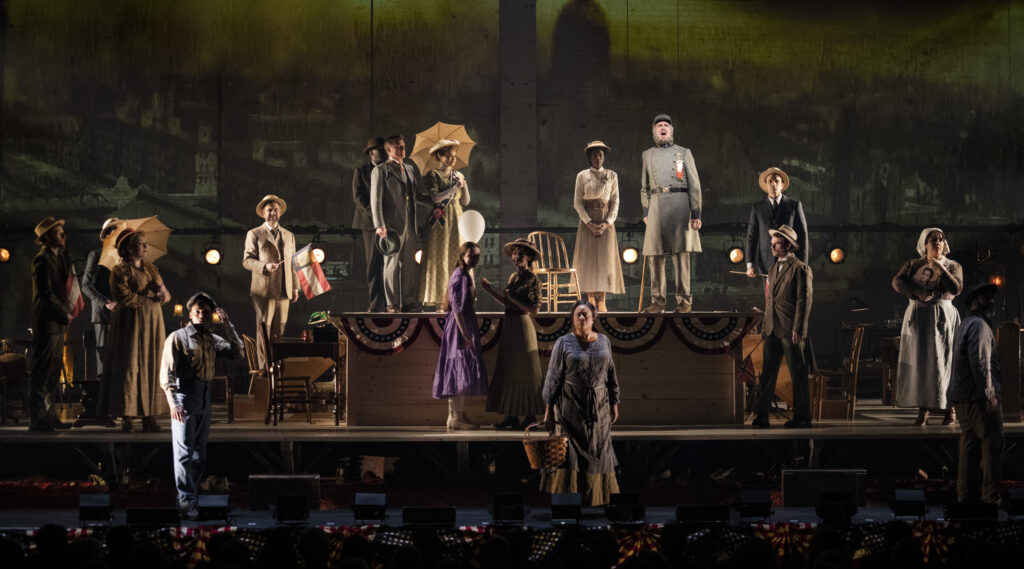
Central to Parade’s story are the heartfelt and electric portrayals of Platt’s Leo Frank and Diamond’s Lucille Frank. Though both characters are Jewish, culturally their regional differences and attitudes stand in the way of their “more perfect union.” Raised in Brooklyn and college educated, Leo is uneasy with Atlanta’s bigotry and Confederate patriotism during the four years in his position as superintendent of a pencil factory. A hometown Atlanta resident, Lucille is demure and sweet. She accepts the culture and tolerates the attitudes of the townspeople and their Confederate Memorial Day parade, which she enjoys.
The true test of their marriage comes when Leo is put on trial for murdering 13-year-old Mary Phagan (Erin Rose Doyle), a factory worker.
At the heart of Uhry’s book, Parade asks questions about our nation’s past. It reveals bigoted folkways in Confederate Memorial Day celebrations which open and close the musical (“The Old Red Hills of Home,” “The Dream of Atlanta,” “Finale”). The discriminatory Confederate beliefs migrated from the past to bleed into the present, evidenced in mass shootings in schools, churches, synagogues and grocery stores. It is these beliefs that shape Leo Frank’s innocence into a guilty verdict, which Parade examines and indicts.
Leo’s trial progresses quickly. The townspeople’s heightened emotions combine to create a mounting river of fury. Following their own agendas, reporter Britt Craig (a fine Jay Armstrong Johnson) and the conservative newspaper publisher of “The Jeffersonian,” Tom Watson (the fiery Manoel Felciano) whip up the townsfolk against Leo (“Real Big News,” “Hammer of Justice”). The songs they and the company sing are mesmerizing and pointedly chilling. The intimated violence can only be answered by vengeance. However, behind the “hand of justice” lurk individuals who seek their own brand of justice for political reasons.
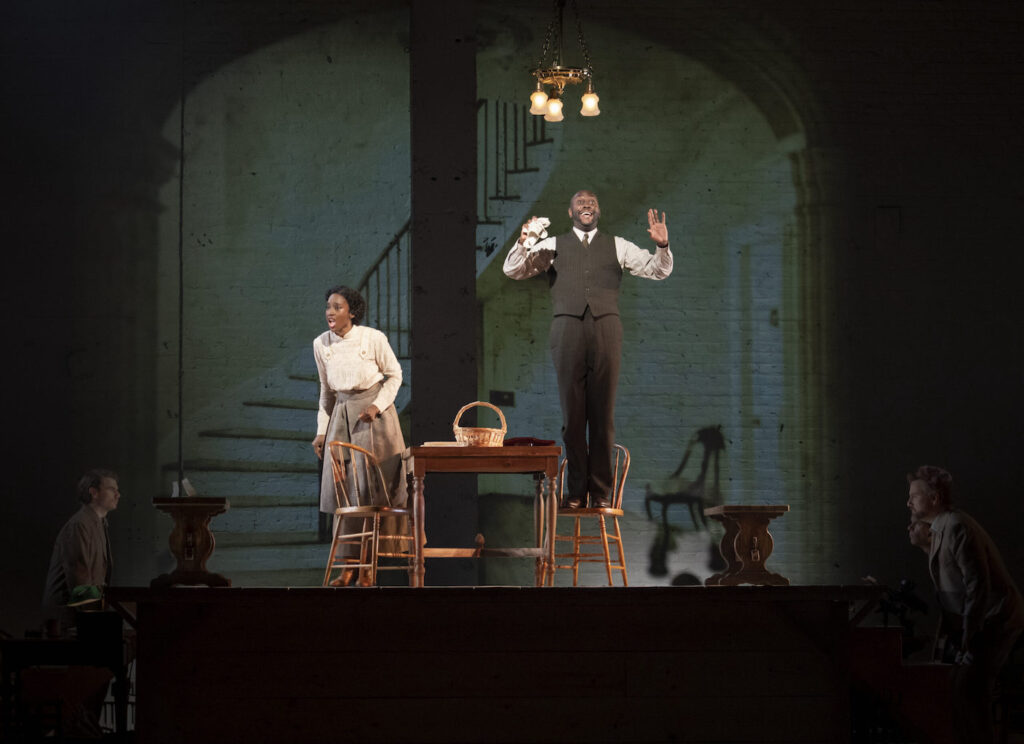
Prosecutor Dorsey (the exceptional Paul Alexander Nolan) manufactures lies, coaches the fabricated testimony of three factory girls, and extorts lies from Black factory janitor Jim Conley (a sensational Alex Joseph Grayson), a key prosecution witness. He pressures their Black maid (Danielle Lee Greaves) to lie on the stand. With the help of a partisan jury and complicit judge, Dorsey’s bogus case of lies and circumstantial evidence against Leo Frank dooms him to hang.
Initially encouraged by Sean Allan Krill’s Governor Slaton, spurred on by Tom Watson, and seduced by Howard McGillin’s Judge Roan, that he will be the next Georgia governor, Dorsey’s lust for power swamps his moral compass. Krill, Nolan, Felciano and McGillin, portraying the elites who carry power, are forceful and terrifying, as they sing with malevolent, melodic urgency. Together they create a corrupt web to hang Leo Frank, until circumstances change, and the power of love takes charge in the shape of Lucille Frank.
After Lucille confronts Leo (“Do It Alone”) in an exorcism of hurt and anger, she determines to fight for him. Lucille challenges Slaton to reopen the case and re-examine its contradictions. Feeling the weight of guilt on his heart because he knows Leo is innocent, with her help Slaton finds the evidence to commute Leo’s sentence. It is a heroic act that, ultimately, destroys the governor’s career and forfeits Leo’s life. The scenes between Krill’s Slaton and Diamond’s Lucille are some of the most uplifting in the production.
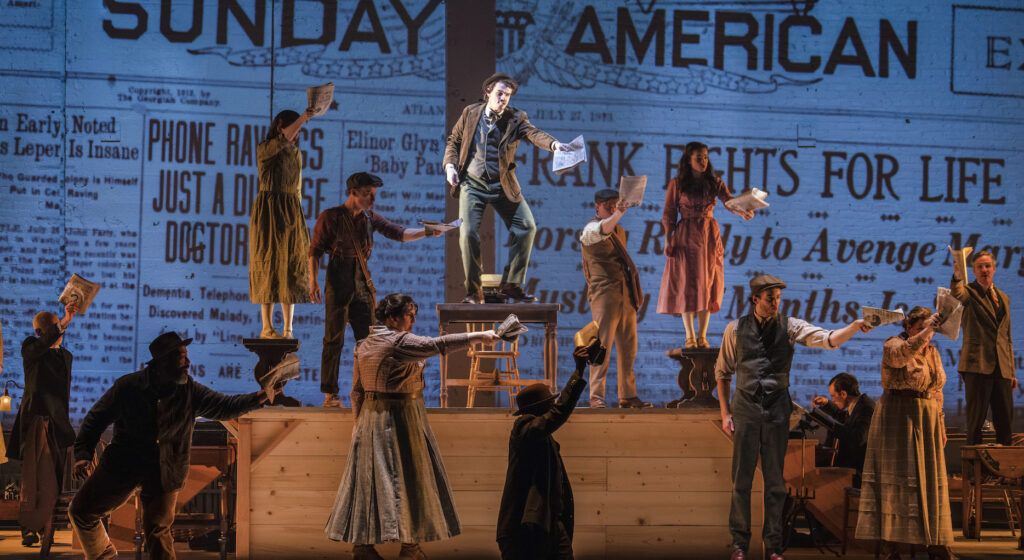
Lucille’s monumental effort to save Leo redeems their love and unites them in a joyful, fulfilling relationship. With anointed fervor, they sing “This Is Not Over Yet,” during which Platt and Diamond rock the house, conveying spiritual truth with conviction and power. Importantly, “All the Wasted Time” becomes an epiphany. Lucille’s love with Leo’s loving acceptance transforms the prison cell into a heavenly place, where they picnic in their imaginations—outdoors in a lush, green landscape. Here, Sven Ortel’s projection design and Arden’s staging are nonpareils, fantastic and poignant. Unbeknownst to the couple, this is their last supper together.
Arden’s well-thought-out vision for Parade is magnified by Dane Laffrey’s set design. Most of the action takes place on the raised wooden platform that changes into a speaker’s dais, governor’s mansion ballroom, courtroom and gallows, all cleverly defined by Heather Gilbert’s lighting design. Underneath the platform stars-and-stripes buntings are draped to symbolize a nation that is a party to the Confederacy, whose flags are “paraded” during celebrations. Most importantly, Sven Ortel’s projection design displays times, dates and locations for various scenes and includes sepia-toned photographs of the Franks, the Phagans, and others, that ground us in the historicity of the events focusing on the Leo Frank case. The case was re-opened in 2019 . . . “This is not over yet!”
Parade is spectacular.
Parade. Through August 6 at the Bernard B. Jacobs Theatre (242 West 45th Street, between Seventh and Eighth Avenues). www.paradebroadway.com
Photos: Joan Marcus
Cover Photo: Micaela Diamond and Ben Platt


